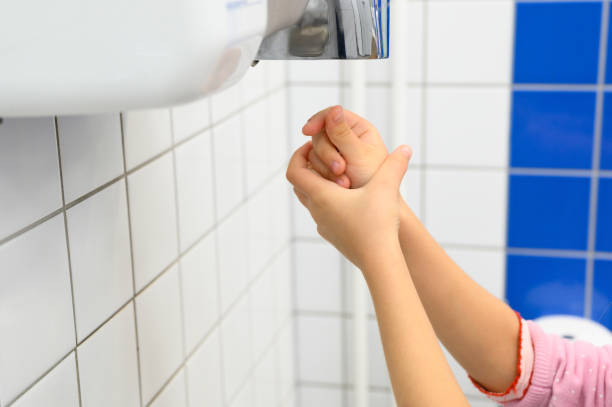Relationship between Level of Knowledge and 5 moment Hand Hygiene Practice among Assistant Healthcare in Malaysia Teaching Hospital.
DOI:
https://doi.org/10.23917/bik.v17i2.3296Keywords:
hand higiene, compliance, healthcare assistant, knowledge and attitudeAbstract
Hand hygiene is a handwashing method that significantly lowers the likelihood of pathogens (dangerous germs) on the hands. While assistant healthcare workers are part of the healthcare team, they always deal with patients' care but did not get proper training like nurses or doctors before becoming assistant healthcare This study is to assess the relationship between level of knowledge and five moments hand hygiene practice among assistants healthcare in one of the teaching hospitals in Malaysia. A cross-sectional research methodology was used; 154 Assistants healthcarewere chosen using random number generators after the sample size was calculated. The Knowledge, Attitude, and Practice on Hand Hygiene questionnaire used was adopted from WHO publications. The ANOVA revealed a significant effect of Level of Knowledge on Level of Practice (F(1, 152) = 3.416, p = 0.006). Specifically, for each unit increase in Level of Knowledge, Level of Practice increased by 57.725 units (β = 57.725, p = 0.006). These findings emphasise the need for targeted interventions and training programmes aimed at bridging the knowledge-practice divide and eventually raising hand hygiene compliance in the medical setting
Downloads
References
Allegranzi, B., Gayet-Ageron, A., Damani, N., Bengaly, L., McLaws, M. L., Moro, M. L., Memish, Z., Urroz, O., Richet, H., Storr, J., Donaldson, L., & Pittet, D. (2013). Global implementation of WHO's multimodal strategy for improvement of hand hygiene: a quasi-experimental study. The Lancet. Infectious diseases, 13(10), 843–851. https://doi.org/10.1016/S1473-3099(13)70163-4
Al Salman JM, Hani S, de Marcellis-Warin N, Isa SF., (2015). Effectiveness of an electronic hand hygiene monitoring system on healthcare workers' compliance to guidelines. Infect Public Health. Mar-Apr;8(2):117-26.https://doi.:10.1016/j.jiph.2014.07.019
Al Sawafi, K. M. (2021). Examining the importance of hand hygiene policy and patient safety culture on improving healthcare workers’ adherence to hand hygiene practice in critical care settings in the Sultanate of Oman: a scoping review. Cureus, 13(11).
Au, J.K.L., Suen, L.K.P. & Lam, S.C. (2021). Observational study of compliance with infection control practices among healthcare workers in subsidized and private residential care homes. BMC Infect Dis 21, 75. https://doi.org/10.1186/s12879-021-05767-8
Barakat, A. M., & Kasemy, Z. A. (2020). Preventive health behaviours during coronavirus disease 2019 pandemic based on health belief model among Egyptians. Middle East Current Psychiatry, 27(1),1-9. https://www.sciencedirect.com/science/article/pii/S0196655320310348
Chou, Daud & Achan, Pramod & Ramachandran, Manoj. (2012). The World Health Organization '5 Moments of Hand Hygiene': The scientific foundation. The Journal of bone and joint surgery. British volume. 94. 441-5. https://doi.org/10.1302/0301 620X.94B4.27772 .
Das, P., Khuntia, P., Das, M., Bisoi, D., Shekar, N., & Pujari, P. (2022). Evaluation of knowledge, attitude, and practice regarding hand hygiene practices among inpatients of kalinga institute of medical sciences Bhubaneswar: A preliminary study. Journal of Pharmacy And Bioallied Sciences, 14(5), 568. https://doi.org/10.4103/jpbs.jpbs_570_21
Gaube, S., Fischer, P., & Lermer, E. (2021). Hand(y) hygiene insights: Applying three theoretical models to investigate hospital patients' and visitors' hand hygiene behavior. PLOS ONE,16(1), e0245543.
https://doi.org/10.1371/journal.pone.0245543
Luangasanatip, N., Hongsuwan, M., Limmathurotsakul, D., Lubell, Y., Lee, A., Harbath, S., Cooper, B. (2015). Comparative efficacy of interventions to promote hand hygiene in Hospital: Systematic review and network meta-analysis. British Medical Journal, 351, 1– 14.
Ministry of Health Malaysia. (2019). Guidelines for Healthcare assistant. https://www.moh.gov.my/guidelines
Muna Yousif , Tara Tancred., and Marwa Abuzaid. (2020). A Survey Of Knowledge, Attitudes And Practices Regarding Hand Hygiene Among Doctors And Nurses In Ribat University Hospital. International Journal of Medical Reviews and Case Reports (2020) 4(2):19 27.
Sin, C. S., & Rochelle, T. L. (2022). Using the theory of planned behaviour to explain hand hygiene among nurses in Hong Kong during COVID-19. Journal of Hospital Infection, 123, 119-125.
https://www.sciencedirect.com/science/article/pii/S0195670122000330
Shobowale E.O., Adegunle B.,& Onyedibe K., (2016). An assessment of hand hygiene practices of healthcare workers of a semi-urban teaching hospital using the five moments of hand hygiene. Niger Med J. May-Jun;57(3):150-4. doi: 10.4103/03001652.184058. PMID: 27397953; PMCID: PMC4924395.
Wright, L., Steptoe, A., & Fancourt, D. (2022). Patterns of compliance with COVID-19 preventive behaviours: a latent class analysis of 20 000 UK adults. Journal of epidemiology and community health, 76(3), 247–253. https://doi.org/10.1136/jech-2021-216876

Downloads
Submitted
Accepted
Published
How to Cite
Issue
Section
License
Copyright (c) 2024 Wan Latifah Wan Ahmad, Mazlinda Musa, Hamidah Hassan, Rohani Mamat; Enita Dewi; Sharina Abd Kassim, Siti Fatimah Sa'at, Baidi Baddiri

This work is licensed under a Creative Commons Attribution 4.0 International License.


















